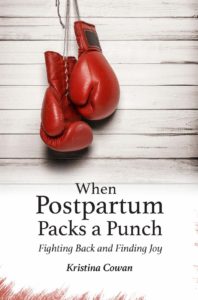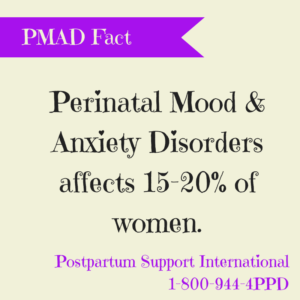 “The world needs more educated conversations on maternal mental health,” [tweet that!] Kristina Cowan says in her new book. “We should have these talks until the truth becomes second nature” (p. 126).
“The world needs more educated conversations on maternal mental health,” [tweet that!] Kristina Cowan says in her new book. “We should have these talks until the truth becomes second nature” (p. 126).
Two weeks ago, I reviewed When Postpartum Packs a Punch by Kristina Cowan. This week, I have the privilege to interview her.
Kristina, along with other women’s stories, you share your own struggle with postpartum depression.
In the first chapter, you write, “Silent suffering isn’t my style. I didn’t hide my tears. I shared my intrusive thoughts, as they’re called, with my husband, and with our families and friends. Eventually I called my OB” (p. 23).
What advice would you give women who tend to keep their mental and emotional pain private?
Find at least one person with whom you can share your story.
Postpartum Support International offers an excellent resource to help new parents, the PSI Warmline. You can leave a confidential message anytime, and a volunteer will call you back as soon as possible.
Volunteers offer encouragement, and they can connect you with local resources. The Warmline is 1-800-944-4773 (4PPD).
If you’d rather talk to someone you know, seek a trusted friend, coworker, or family member.
While researching this book, you interviewed many women who struggled with perinatal mood disorders. What was the most interesting thing you discovered?
It’s hard to pick one. I learned something interesting every day I did research and writing, and that was close to five years.
What I still marvel at is how the United States—the most advanced nation in history—isn’t more progressive with mental health. Mental illness often is still portrayed as a weakness or character flaw. We’ve made strides in the last 20 years. But the road ahead is long.
We should take a cue from other countries, like the U.K., which leads the way in mental health care. The Duke and Duchess of Cambridge and Prince Harry, for example, lead initiatives, launch organizations, share their stories, and spur others to follow suit. There’s immense power in that.

Kristina with her husband, Matt, and their two children.
How did you find out you have hypothyroidism caused by Hashimoto’s Disease? How do you think undiagnosed and untreated Hashimoto’s thyroiditis contributed to your postpartum depression?
When I was six months postpartum, I had a wave of odd symptoms: joint pain, extreme fatigue, inexplicable bouts of sadness. My OB ordered bloodwork, which showed my thyroid levels were off. I later went to an endocrinologist, who diagnosed me with Hashimoto’s disease.
I believe Hashimoto’s played a key role in my PPD. A new study shows that women who develop an autoimmune thyroid disorder after childbirth are twice as likely to face a postpartum mood disorder.
While reporting for the book, I talked to several women who similarly developed thyroid problems after they had children. We need more research and screening along these lines, and caregivers should test the thyroid levels of all women with postpartum mood disorders.
 If you could ensure readers take away just one thing from your book, what would it be?
If you could ensure readers take away just one thing from your book, what would it be?
Share your story—whatever it is. Stories are the stuff of healing and hope, the very way we get through our days. At first sharing helps you heal. Eventually, sharing your story of illness and recovery will help others heal. There’s nothing better than that.
Whether you, a patient, or a loved one is facing a perinatal mood disorder, Kristina Cowan wants you to know that help is available. Order your copy of When Postpartum Packs a Punch here!
